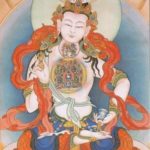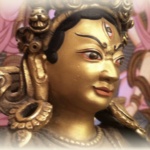The Five Precepts
The basic vows for Buddhists to live by are known as “The Five Precepts.”
Teachings on the five precepts often accompany refuge vows as a guide for how to live as a Buddhist.
Here the five vows are explained by Pema Khandro for in the section on the instructions to her students in the practice manual, “Presence as the Path.” For more details, consult that manual.
The five vows are interpreted in various ways according to the teaching and philosophical vehicle. This interpretation is in regards to how Pema Khandro and her sanghas practice Vajrayana.
“Understand that ethical discipline lies at the very root of the teachings. Harmful actions lead to the experience of lower realms. Without the observance of your vows, the foundation of your life will rot. Ethical discipline supports all of your positive qualities…It is the vehicle that will convey you to liberation. ”
– Longchenpa, from the Pith Instructions
The Five Precepts – List and Explanation
- Avoiding harming other beings
- Avoiding taking what has not been given
- Avoiding sexual misconduct
- Avoiding false speech
- Avoiding loss of awareness
1. Avoiding harming other beings
The Tibetan phrase is: སྲོག་གཅོད་པ་སོང་བ srog gcod pa song ba
“Do not cut the life force.”
Committed to non-aggression, I resolve to avoid harming others, to avoid injuring the body or mind of myself and others. I resolve conflicts and tensions with an attitude of openness and loving-kindness, acknowledging transgressions and seeking reconciliations. I base my dietary choices on compassionate intention. Rather than taking the attitude that the ‘ends justify the means,’ I commit to non-violence as the base, the path and fruit of my actions. I resolve to relieve the suffering of beings wherever I see it and to make compassionate connections with everything everywhere.
2. Avoiding taking what has not been given
The Tibetan phrase is: མ་བྱིན་པར་ལེན་སྤོང་བ – ma byin par len spong ba
“Do not take what has not been given.”
I avoid taken what is not freely given. I exert to avoid depriving others through my presence in this world, to avoid exploitation of others and to avoid squandering resources. I avoid misusing the time and generosity of others. I avoid misusing my authority or status, and I respect the autonomy, needs and rights of others. I avoid robbing others of meaning and value by respecting others perspectives and religious beliefs. I avoid taking advantage of others generosity in laziness or carelessness. I exert to educate myself on issues of racism, sexual abuse, colonialism, environmental destruction, animal cruelty and other issues of exploitation in order to use my time and my life to further respect for the dignity of myself, others and the earth. I take responsibility to help when help is needed, helping according to my capacity. I resolve to be a giver more than a taker. I commit myself to contribute generously to everything I am connected to. I bring the spirit of service, sharing, giving, forgiving and inclusivity to my activities. Recognizing the innate richness in myself and others, I train to live in a gracious attitude of hospitality and altruism.
3. Avoiding sexual misconduct
The Tibetan phrase is: འདོད་པས་ལོག་པར་གཡེམ་པ་སྤོང་བ- ‘dod pas log par g.yem pa spong ba
“Abandon sexual misconduct.”
I remain always in respect by treating myself and others with dignity, through respecting the intrinsically complete buddha-nature of myself and others. When I have a partner, I respect my intimate partner at all levels as an equal partner. I recognize that celibacy and non-celibacy have the same principle: to devote the body to liberation of oneself and others. Therefore, I commit my sexuality or celibacy for the realized union of body, mind and emotions, and for the integrity of self, other, community and society. I avoid sexual exploitation, manipulation, deception, discrimination, harassment, and objectification. I undermine misogyny by respecting marriage, relationships and sexuality. I undermine abuse and infidelity by being transparent and honest about my relationship status. I undermine abuse by seeking enthusiastic verbal consent in my romantic relationships. I understand that consent may not be possible in asymmetrical power relationships. I disentangle sexual relationships from asymmetrical power relationships in order to undermine the patriarchal systems that have exploited women, girls, and other vulnerable and marginalized people for centuries. I recognize that causing others to break their vows is the same as breaking vows myself and therefore I abide by the vows of others, refraining for sexual relationships with monastics or those in monogamous relationships. I respect the expression of the spectrum of genders within myself and others as it manifests according to each person’s art of being.
4. Avoiding false speech
The Tibetan phrase is: བརྫུན་དུ་སྨྲ་སྤོང་བ- brdzun du smra spong ba–
“Abandon false speech.”
I avoid taking refuge in the lie of dualism. Ever advancing toward less manipulative, self-protective, deceptive speech, I refrain from using my speech for rationalizing neurotic views and behavior. I refrain from all bigoted, sectarian, racist, sexist, judgmental, and arrogant speech that condemns others. I avoid harsh speech, gossip and useless chatter. I develop increasing capacity for deep listening and authentic communication. I train my speech and emotions in order to use speech with non-violence, empathy, sensitivity and kindness. I use kind speech to set appropriate boundaries and respect others’ boundaries in calmness and clarity. I respect confidentiality and respect the disclosures of others. I refrain from offering unsolicited advice. I recognize that silence or withholding can be a misuse of speech. I speak up to prevent others from being harmed by racism, sexism, abuse and other forms of domination.
5. Avoiding loss of awareness
The Tibetan phrase is: མྱོས་པར་འགྱུར་བའི་བདུང་བ་སྤོང་བ – myos par ‘gyur ba’i bdung ba spong ba – “Abandon the demented state.”
I embrace the radical sobriety of the unaltered state and I give myself over to naturally intoxicated appreciation of the phenomenal world. I avoid deliberate loss of awareness through substance use or abuse. I avoid mindless consumption of anything. I avoid spiritual delusions that put me out of touch with common sense, morality and shared experiences of conventional reality. I apply renunciation where necessary. I avoid what clouds my mind and adhere to diet, drinks and medicines which bring forth pristine presence, sanity, compassionate awareness for my body, mind, my family, my community, and my society.
Colophon
With these issues at heart, the text on the five precepts was composed by myself, Pema Khandro. It is based on the Five Precepts in my own experience, in teachings given to my own personal students within the unique world we find ourselves in. It is also based on the teaching of the ten actions to avoid and elements of the fourteen precepts, the Vajrayana samaya vows. Aspects of the text are original writing and other aspects are drawn from the Five Precepts texts that impacted me the most, which were from Longchenpa, the San Francisco Zen Center, Patrul Rinpoche, Ngak’chang Rinpoche and Thich Nhat Hanh. If there is anything omitted or in error in this list, I take full responsibility. I pray that teachings arise to fill in any gaps or correct any errors.




